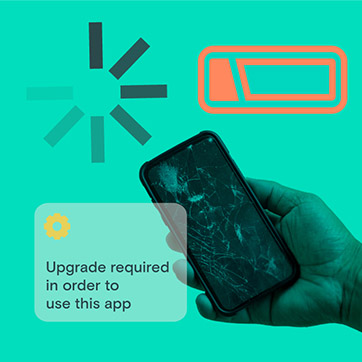Is It Worth It to Buy the Latest Phone?
August 27, 2021 • 14 minute read
A vast majority of people in the United States — 85%, according to Pew Research — own a smartphone. Most people can’t imagine being without their smartphone, and many like to buy a new one annually. But is that a wise move?
It’s easy to see why people rush out to buy the latest phone: Smartphone manufacturers have perfected the marketing for new phones, showcasing enhanced technology in a way that plays on people’s fear of missing out (FOMO). Although there’s no denying that these powerful minicomputers are critical to today’s society, they can be quite expensive, often with a price tag of $1,000 or more.
Many situations call for upgrading your phone, such as a broken screen, slow functionality or an operating system that’s incompatible with the latest apps or security patches. But, should you get the newest release or an older model that’s good enough?
With the expected release of the new iPhone 13 in September 2021, now may be the perfect time to weigh both the benefits and the drawbacks of buying the latest phone. Before you chase that shiny new object, here are a few important things to keep in mind to determine the true value of an upgrade versus the value of waiting until the next model comes out.
Cost considerations
Cost is a key factor to keep in mind as you think about a smartphone upgrade. An ongoing chip shortage has led to a lack of access to the raw and finished materials necessary for manufacturing new Android and iPhone models (along with tablets, iPods and other wireless devices). As a result, new phones are expected to have significantly higher price tags than they have in the past.
In addition, the availability of newly released smartphones may be limited. When there’s limited supply, the value of owning that item increases, which in turn increases demand. And that demand can rapidly drive up prices of smartphones well beyond the value of their components.
When should you upgrade your phone?
Most high-quality smartphones are well-built, especially phones made by recognized manufacturers, so you may not need to replace yours as often as you think. But getting the latest phone may make sense in many situations. Let’s look at some examples of when you should consider getting a new phone.

Cracked screen
A cracked screen can be replaced, but if components under the screen are also damaged, the cost of replacing it may be several hundred dollars. If you have an older phone that needs this type of repair, you’ll likely be better off buying a new phone.
Security patches
Some older phones may be running an out-of-date operating system that’s no longer supported by security patches. Lack of the latest security can increase your phone’s vulnerability to hacking, malware and viruses, so it’s better to err on the side of safety and security and get a new phone.
Operating system
All phones eventually need upgrades to their operating systems. However, the hardware on older phones may not be able to handle the upgrade to a new operating system. If you plan to buy a new phone, be sure it’s running the latest operating system to help minimize any problems with software updates down the road.
Support
Smartphone manufacturers typically support software updates for several years. When that support ends, it may also mean the materials you need for screen replacements, new batteries or other components are harder to obtain. If you’re entering this territory, you may want to consider upgrading your phone.
Crashing
If you find your apps are crashing on your phone, first try to discover the cause. It may be a problem within the app. In that case, deleting the app and installing it again often resolves the issue. However, crashing apps may also indicate a problem with your phone’s software or hardware, or that your phone is low on memory. If you don’t have enough memory (also known as random access memory, or RAM) on your phone, additional problems may occur, including lack of storage for photos. You can increase your phone’s memory through micro-SD or memory cards, etc., but being short on RAM on an older phone may be an indicator that it’s time for a new phone.

If your phone is dropping calls, not connecting to wireless or cellular hot spots, or otherwise not working reliably, contact your wireless carrier. In some cases, a new phone won’t solve the problem — you may need a new service provider that offers a better signal for your area or better call reliability. A new phone may seem like an easy fix, but if it doesn’t work reliably with your current carrier, it probably won’t meet your expectations.
Phone performance considerations
Smartphones can suffer from a variety of common traumatic incidents, including falls into the toilet or onto the sidewalk. Not only do these types of incidents damage the exterior of the phone, but they can also damage the delicate components within the phone.
Even if your phone hasn’t suffered physical trauma, it can begin to malfunction or slow down over time from consistent use. A slow phone can be a real nuisance for anyone who regularly streams videos or plays games on their phone.
To help analyze your current phone’s functionality, ask yourself three questions:
- Is your phone working well? If it’s banged up but still functioning normally, you may not need to replace it. But if your phone glitches, the power doesn’t stay on, or it has microphone and speaker problems, an update may be beneficial.
- Is your phone running slow? A slow phone may mean some software is running in the background. This can restrict the function of the phone’s computer processor, much like what happens on a computer or laptop. A slow phone may be a red flag indicating your phone has a virus, or it may be out of memory.
- How long does your phone’s battery last? A common problem with older phones is the inability to hold a charge. Over time, a phone’s battery loses its ability to hold a charge for as long as it did when the phone was new. Replacing the battery may be an option, but for older phones, it may not be worth the cost.

The decision to upgrade your phone depends on many reasons unique to your personal situation, but if you have a non-operational or low-functioning phone due to wear and tear or memory and battery issues, it may be time to upgrade.
Latest phone features vs. cost
One of the most common reasons people purchase a new smartphone is because they love the idea of the latest technology and features. Smartphone manufacturers usually announce their new phones with a lot of fanfare, and they build high expectations with promises of mind-blowing technology.
Only you can decide if the cost for the features of a new phone is worth it. However, you can get a better idea of the value if you spend some time comparing the new phone’s features with your current phone’s features. Before succumbing to the slick ads, ask yourself these questions about some of the typical technology offered on the latest phones:
- Does the new phone offer a better camera? Compare the specs on your current phone with the specs on the new phone.
- Does the latest phone offer a significant amount of memory? Newer phones typically promise a larger amount of available memory. That can be a good thing if your existing phone doesn’t have much memory and you use a lot of memory.
- Does the new phone use 5G technology? 5G increases network speed (and therefore your phone’s speed) and is one of the most prominent features offered by many smartphone manufacturers and wireless services. If you have an older phone, making the move to 5G may be beneficial. However, if you have a modern phone with 4G technology, you may not notice a significant difference.
As you compare the features of your current phone with those of the latest phone, be leery of nonspecific descriptions of technology on the new phone. For example, if the phone features the “newest level of technology in screen protection,” that doesn’t necessarily mean it’s a brand-new technology. Check your phone’s specs to see if your phone already has the same technology.
Will you really use the phone's new features?

The latest iPhone and Android smartphones typically feature new technology, such as longer battery life, a more robust screen that’s less likely to shatter or a better camera. Before you buy, though, make sure you’ll be spending money on features you’re likely to use.
For example, a fingerprint sensor was once the hottest update to smartphones. Today, most phones come with them, yet a lot of people still don’t use them. Other examples are iris scanners or camera options for shooting 4K video or for taking selfies in the dark. Carefully consider the new features to decide whether you think you might really use them.
Is it better to buy a new phone outright or with a contract?
The final thing to think about when considering a smartphone upgrade is whether to purchase the phone outright or lock into a contract with monthly payments. A major profit point for wireless providers comes from the monthly interest and fees paid by buyers.
Here are some questions to ask yourself before agreeing to a monthly payment plan:
- Will you pay more for the phone with a new contract than you would buying it outright? A new contract usually means new terms — not just for the phone, but also for the services you obtain.
- Will the monthly payments be charged at a higher rate, with included interest and fees? If so, that makes the purchase of the phone significantly more expensive over the long term.
- Can you pay for the phone out of pocket instead of charging it to a credit card? If you buy the phone with a credit card and don’t pay that amount in full over the next statement period, the cost of the phone increases due to the interest on your credit card.
Also, keep in mind that entering a cellphone service contract usually comes with the commitment to maintain that contract for the full period. If you want to end the contract, you may have to pay a fee.
Finally, take into consideration the cost of any warranties or exclusions on a phone contract. Be sure you understand all the fees associated with the new contract and what to expect from the service level provided.
There are plenty of compelling reasons to upgrade to the latest phone. But if you can’t prove to yourself that an upgrade is worthwhile, you’d be better off to put that money in the bank and wait another year. Waiting may mean you’ll have a better choice of phones with superior tech features and functionality, and you’ll save money in the interim.
